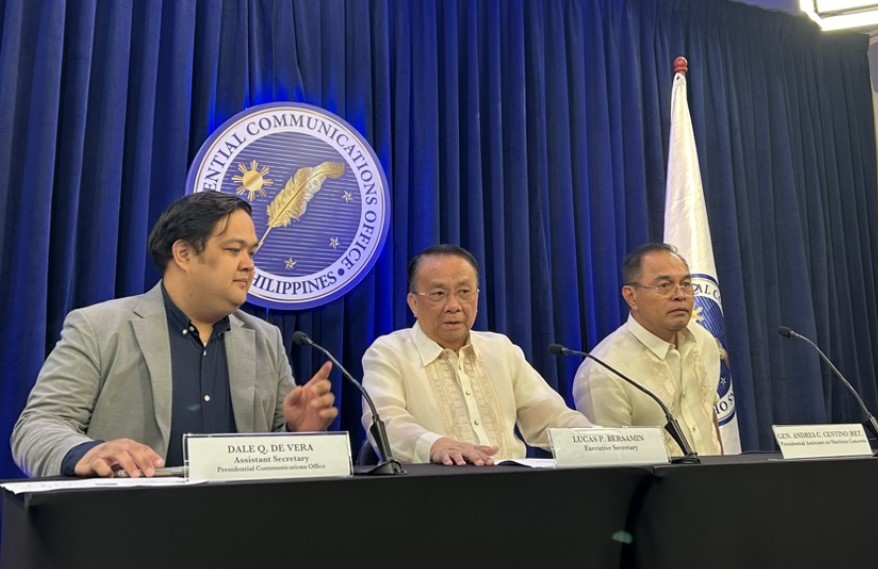Palace: China harassment at Ayungin not an armed attack

The latest incident of harassment by China vessels on Philippine boats, which caused a Navy man to lose his thumb and several others to be injured, is not an armed attack that may trigger the Philippines' Mutual Defense Treaty with the superpower United States, Malacañang said on Friday.
In a news conference, Executive Secretary Lucas Bersamin said the incident was ''probably a misunderstanding or accident.''
''No, well this was probably a misunderstanding or accident, we are not yet ready to classify this as an armed attack. I don't know kung 'yung mga nakita namin is mga bolo, ax, nothing beyond that,'' Bersamin said.
The Armed Forces of the Philippines (AFP) has confirmed that a Philippine Navy serviceman was severely hurt in a collision between a Chinese ship and a Filipino vessel performing rotation and resupply mission in Ayungin Shoal.
According to a 24 Oras report by Joseph Morong, seven servicemen were injured during the June 17 hostile incident, including one who lost a thumb.
Earlier, AFP Public Affairs Office chief Colonel Xerxes Trinidad said the service member was safely evacuated and received prompt medical treatment after China Coast Guard's (CCG) "intentional high-speed ramming" of the Philippine vessel.
Presidential Assistant for Maritime Concerns Andres Centino said Friday that invoking the Mutual Defense Treaty (MDT) is not yet being considered despite the June 17 incident in Ayungin Shoal involving Philippine Navy sailors and Chinese Coast Guard personnel.
''That has not been—, your question about the invocation of the Mutual Defense Treaty, that has not been considered in our discussions,'' Centino said during a Palace press conference.
Mutual Defense Treaty
Bersamin led the second meeting of the National Maritime Council at Malacañang today, which was held in accordance with the mandates specified in Executive Order No. 57, series of 2024, signed by President Ferdinand "Bongbong" Marcos Jr.
The meeting was also called upon in light of China's recent hostile acts in the West Philippine Sea, according to Bersamin.
In April, Marcos said the Philippines would invoke the MDT in the event a Filipino soldier died in the West Philippine Sea.
Under the 1951 MDT between Manila and Washington, each party "recognizes that an armed attack in the Pacific area on either of the Parties would be dangerous to its own peace and safety and declares that it would act to meet the common dangers in accordance with its constitutional processes."
Likewise, the MDT provides that "an armed attack on either of the Parties is deemed to include an armed attack on the metropolitan territory of either of the Parties, or on the Island territories under its jurisdiction in the Pacific Ocean, its armed forces, public vessels or aircraft in the Pacific."
Brandishing knives
Last Monday, Chinese Coast Guard personnel, brandishing knives, an axe, and pointed sticks, repeatedly rammed then boarded Philippine Navy rubber boats, to stop them from delivering food supplies, firearms and other necessities to Filipino troops at the shoal.
Videos and photos released by the Philippine military showed tense confrontation at the shoal and Philippine boats slashed and navigational screen smashed. China seized two Philippine boats and several M4 rifles.
In a statement, the DFA earlier said it "denounces the illegal and aggressive actions of Chinese authorities that resulted in personnel injury and vessel damage."
As it expressed grave concern over the incident, the DFA said that it has been exerting efforts to rebuild a conducive environment for dialogue and consultation with China with regard to issues on the South China Sea.
"We expect China to act sincerely and responsibly, and refrain from behavior that puts to risk the safety of personnel and vessels," the DFA said.
The latest Chinese action–the most violent to date–drew condemnations from the United States, Japan, Australia, Canada, United Kingdom, and the 28-member European Union, among others, but was met with silence by the Association of South East Asian Nations (ASEAN), of which the Philippines is a member.
'Professional, restrained'
In a briefing on Wednesday, AFP chief Gen. Romeo Brawner likened the Chinese Coast Guard personnel who harassed Filipinos to "pirates."
"They have no right or legal authority to hijack our operations and destroy Philippine vessels," AFP chief General Romeo Brawner said in a briefing on Wednesday. "They boarded our boats illegally, they got our equipment, they acted like pirates."
China took no direct measures against Philippine personnel, its foreign ministry said in response on Wednesday.
"The law enforcement measures... were professional and restrained, aimed at stopping the illegal fishing by Philippine ships, and no direct measures were taken against Philippine personnel," said ministry spokesperson Lin Jian.
Senate probe sought
Earlier on Friday, Senator Imee Marcos urged her colleagues in the Senate to conduct an inquiry, in aid of legislation, on the June 17 incident in Ayungin Shoal.
She said the probe would to determine how the government can better protect Filipino servicemen and citizens during its resupply missions to BRP Sierra Madre, which serves as the Philippine military's outpost in the Ayungin Shoal.
The inquiry was also proposed by the lawmaker to ascertain what changes should be made to the current strategies employed by the Philippine government in order to allow the country to more effectively and safely assert its sovereign rights.
Meanwhile, the AFP on Friday confirmed the passage of four People's Liberation Army Navy (PLAN) vessels through the Balabac Strait between Palawan and Borneo.
Ahead of the new sighting, the Philippine Navy said nearly 150 Chinese vessels were found in various maritime features in the West Philippine Sea. — NB/VDV, GMA Integrated News




